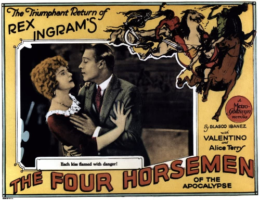Having already published two extensive articles on The Prisoner (see here and here), I didn’t expect to ever write about the series again. But times have changed, and so has The Prisoner. Works of art are living things, and their meaning changes over time. This ultimately has little to do with the artist’s intentions. That The Prisoner had changed was brought home to me one evening when, on a whim, I chose to revisit an episode I had always disliked. (more…)
Tag: conformism
-
Part 4 of 4 (Part 1 here, Part 3 here)
Translated by F. Roger Devlin
The history of modernity can be understood at least in part as a gigantic process of uniformization. Induced by philosophico-moral or political universalism and the diffusion of techniques for the modeling of behavior more effective than those of the most centralized dictatorships, it has expressed itself in the West by the gradual eradication of differentiated ways of life, (more…)
-
Last month, The New York Times published an op-ed by Emma Camp, a student at the University of Virginia (UVA), describing the ideological conformity among her classmates and the social challenges faced by dissenting students. The article was swiftly met with mockery and derision among the blue-check set. (more…)
-
The Four Horsemen of the Apocalypse is in the public domain. You can watch it here.
The Four Horsemen of the Apocalypse is best remembered today for being the film that launched the career of Rudolf Valentino. (more…)
-

Photo: Wikimedia Commons

Photo: Wikimedia Commons
2,248 words
No man, for any considerable period, can wear one face to himself and another to the multitude, without finally getting bewildered as to which may be the true.
— Nathaniel Hawthorne (more…)
-
FEEL!!
I’ve got no inner monologue
I bow before the Synagogue
Maybe I’m an NPC, baby (more…) -
Now and then I encounter fellow travelers who have become fed up with our movement due to what they perceive as the incorrigible stupidity of white people. Let us take stock. Whites are on a fast track to being replaced by some other people (in Europe by black and Arab Muslims, in America by mestizos). Their culture is literally being torn down all around them. (more…)
-
The dying words of John C. Calhoun have always stuck with me, and not in a good way. On his deathbed in 1850, the former vice president and ardent advocate of slavery and states’ rights reportedly lamented, “The South! The poor South!” (more…)
-
January 25, 2016 Matthew Raphael Johnson
The Ukrainian Solzhenitsyn:
The Poetry of Vasyl Stus, Part 3Part 3 of 3
Stus illustrates the idea of meaningless toil that ends only in death in this excerpt: (more…)
-
January 22, 2016 Matthew Raphael Johnson
The Ukrainian Solzhenitsyn:
The Poetry of Vasyl Stus, Part 2Part 2 of 3
III.
Solid ground is death; it’s the rule of matter and the mundane; both air and water are the alternative, the boundary between the nominal and the Real it refuses to see. Yet, terms like “desert” or “tundra” refer to the lonely life of non-affirmation. One cannot create a substitute world; civilization is materialization of dominance. (more…)
-
2,983 words
Moral self-determination is difficult. So are criticism and logic; they are discussed and piously praised until they are used. At that moment, they become oppressive. Vasyl Stus (1938–1985) is not well known in the west; in fact, he is not known at all. Part of the reason is that he is a standing condemnation of the mass society from which poetic “celebrities” are generated. Vasyl Stus spent a substantial portion of his adult life in Soviet Gulags and hence is known to only a few specialists. (more…)
-
In 1961, the Jewish psychologist Stanley Milgram began conducting his now renowned experiment on obedience to authority. The experiment included two test subjects, the Teacher and the Learner. The Teacher was instructed to give the Learner information and then test the Learner’s recall of the information by asking questions. Every time the Learner answered a question incorrectly, the Teacher was required to give an electric shock to the Learner, increasing the voltage after every incorrect answer. (more…)
-
Editor’s Note:
The following text is a transcript by V. S. of part of Jonathan Bowden’s interview at the Union Jack Club in London on Saturday, November 21, 2009, after his famous lecture/performance on Punch and Judy. The title is editorial. (more…)











